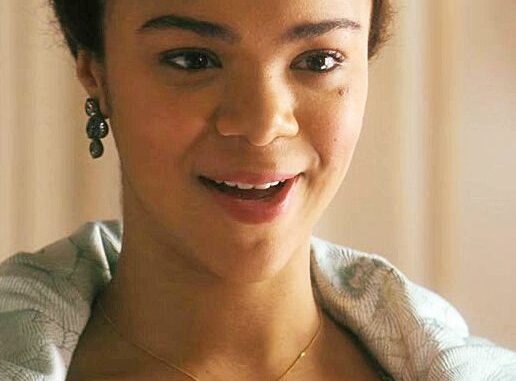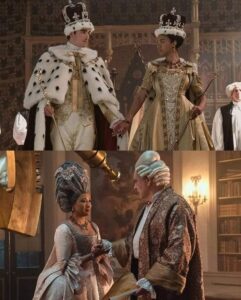
The show chronicles the romance between Charlotte (India Amarteifio) and George III (Corey Mylchreest), which transforms both their lives and eventually an entire nation.
For most of its first hour, Netflix’s Queen Charlotte: A Bridgerton Story plays like a step-by-step instruction manual on how to create an irresistible romance, courtesy of creator Shonda Rhimes.
Step one: Introduce a heroine we can’t help but love in Charlotte (India Amarteifio), a 17-year-old princess who spent the ride to her own wedding darkly joked about skewering herself on her undergarments rather than get married off to a man she hasn’t met. Step two: Engineer a meet-cute between our heroine and said man, George III (Corey Mylchreest), and make him so clearly smitten with her that we find ourselves instantly taken with him too. Step three: Have the pair marry off in a lavish ceremony, and then sent off into the evening to live out them happily-ever-after.
Except we already know in this case that there won’t be a happily-ever-after, or not exactly. Inherent to Queen Charlotte is the tension between the cotton-candy fantasy that’s made Bridgerton so beloved with the thornier ground already laid out for the central couple by the core series (and real-life history). And while the series doesn’t always land on a perfect balance between the two, the challenge ultimately yields a spinoff that’s richer and more complex than the flagship series, but no less delectable in its romance.
Although Queen Charlotte‘s premiere ends a wedding, the fact that the series has five more hours to fill should be an obvious tip-off that the couple are headed for bigger challenges than merely getting to the altar. Here, the utter magic of that first encounter — which Rhimes casts so skillfully, she almost makes it look easy — pays off big time: It keeps us believing in the inherent rightness of their bond, even as the series throws all manner of hurdles at them.

Some will seem familiar to fans of other Bridgerton seasons; of course Charlotte is so naive that she needs the concept of sex explained to her via hastily sketched diagrams. Others echo one of Netflix’s other series about the unbearable angst of British royals. “I am born for the happiness or misery of a great nation, and accordingly must often act contrary to my passions,” George rages about his marriage, and the line might sound borrowed from Charles’ pre-wedding conversation with Elizabeth II on The Crown , or adapted with a bit of era-appropriate tweaking from one of Harry’s grievances in Harry & Meghan. (In fact, it’s lifted from something the actual George III is supposed to have said about a pre-Charlotte love; evidently, this is a common problem with these people.)
And inevitably, some have to do with questions of race and other social issues. Bridgerton‘s first season established that it was the union of George and Charlotte that brought about its ahistorically diverse vision of British high society, thus obligating Queen Charlotte to tackle the issue head on. But the spinoff’s approach lands as both too heavy-handed to ignore and too superficial to take seriously. The “Great Experiment” of integration is considered drastic enough that George marvels after one mixed-race ball that he and Charlotte have “created more change, stepped forward more, than Britain had in the last century.” At the same time, the series is reluctant to probe the ugly attitudes implied by this necessary edict, aside from a few instances of ineffectual grumbling from overt racists. One is almost left with the impression that the only reason England didn’t desegregate sooner was simply that it hadn’t happened to anyone to pull the trigger.
But then, this frothy franchise was never really equipped to handle such topics. Queen Charlotte is blessedly more confident at the task it was actually designed for, which is delivering a romance worth sighing and giggling over. Amarteifio and Mylchreest share an immediate and palpable chemistry that grows steamier as their early marriage devolves into a roiling mess of desire, resentment, hurt and tenderness. And when the plot keeps them apart for long stretches of time, both are occupied by a compelling network of supporting characters with their reasons to scheme for or against the couple — including Charlotte’s ambitious bestie Lady Danbury (Arsema Thomas), George’s calculating mother Augusta ( Michelle Fairley) and, in an unexpected moving touch, pair of utterly loyal butlers (Sam Clemmett’s Brimsley and Freddie Dennis’ Reynolds).
Toss in the requisite jewel-encrusted silks, Vitamin String Quartet pop covers and a healthy sense of humor about the sillier extravagances of the ruling class, and Queen Charlotte manages to replicate the same giddy pleasures of its predecessor. And it does all this without leaning on the illusion of everlasting matrimonial bliss.